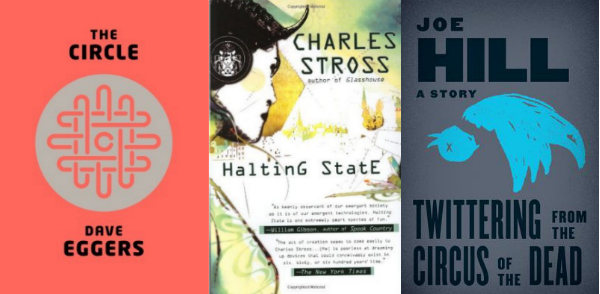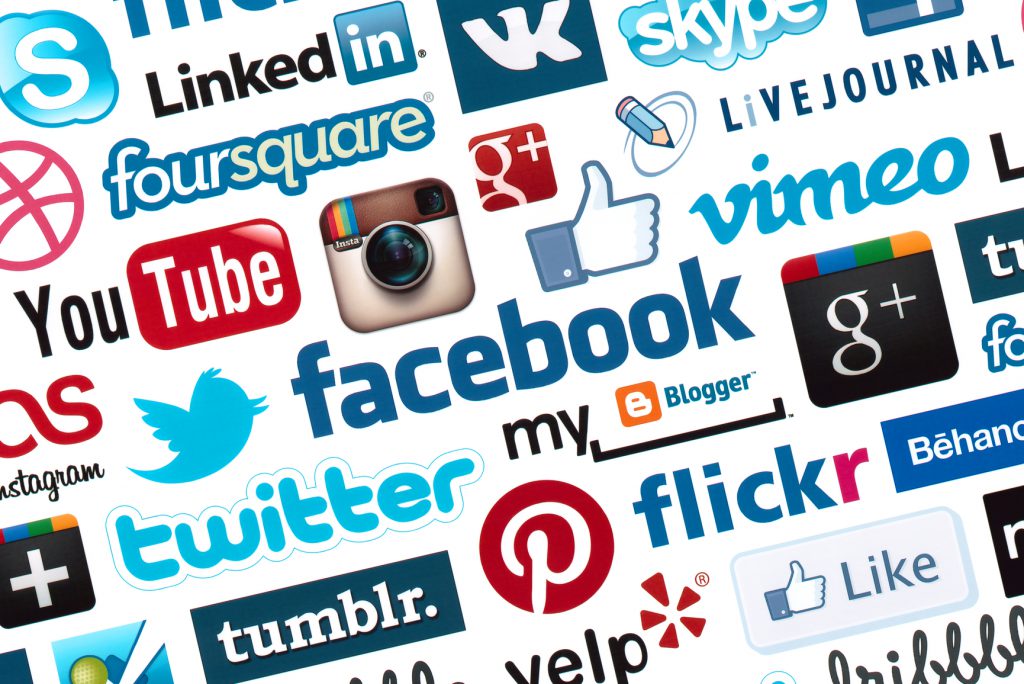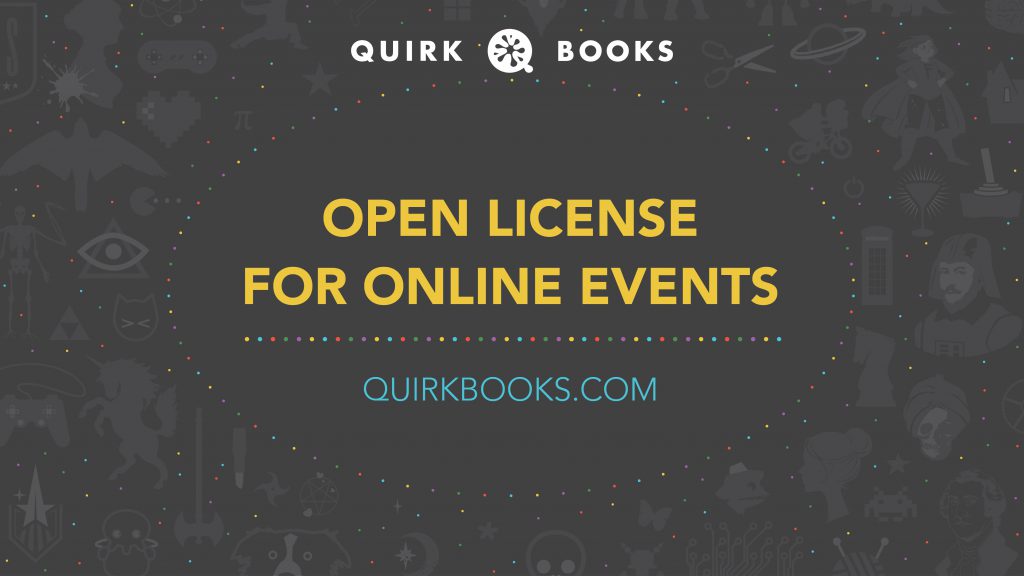Hey! You! Get off the Internet! Haven't you heard? It's Social Media Blackout Day is almost here, a special occasion in which we solemnly reflect upon our lives by returning to a a simpler time of less technological advancement and find respite in the lack of constant sensory overload.
Wait, what do you mean, you haven't heard? Hasn't it been all over Tw — er, maybe you saw it on Fa — no, that's not right. I could have sworn that someone pinned it on — or did they reblog through — wait, how'd you even get here anywhere if it's supposed to be Social Media Blackout Day and you're supposed to be blacked out from Social Media?!
Logical fallacies aside, here are some great books that deal with Internet and social media. Now get off the Internets, kid!

The Circle — Dave Eggers' recent best-selling novel is not about Google. Or Facebook, for that matter. It's about a recent college graduate who goes to work at a massive tech company called The Circle that has revolutionized the Internet, especially search and social media, and has strategically positioned themselves as the perfect technological middleman through which all lives are connected and integrated and broadcast to the world, free-of-charge. And it's mostly set on The Circle's sprawling Bay Area, California campus, which is basically like a summer camp for grownups with all sorts of hip fun perks like ping-pong and beer and roller coasters and free snacks and all that cool stuff. But it's definitely not about Google or Facebook. Nope, not at all.

Little Brother — If you're a grownup like me (well, "grownup"), I will inevitably pitch
Little Brother to you as "teenage boy gets water-boarded and tortured by the US government, so he hacks his xBox to uses it to wage a one-man-war against the Department Of Homeland Security." If you're a teenager and I meet you at a family gathering or something, I usually find a way to hijack your smartphone and
download a free digital copy of the book from Cory Doctorow's website straight to your phone. Then I reveal that I've hijacked your phone by showing you
how I hijacked your phone in order to help you understand the importance of Internet privacy and security, and then tell you absolutely have to read this book that I just downloaded to your phone. (This could also be why I'm not invited to family parties any more…)
Little Brother is thrilling and enlightening and so relevant to our times that it should be required reading in all English classes. It encourages computer literacy and intelligent forms of teenage rebellion (which is why
it's already been banned by some high school English classes) and teaches you how to fight the system.

Twittering From The Circus Of The Damned — An ebook by Joe Hill, the heir apparent of all things horror,
Twittering From The Circus of the Damned tells the story of a fairly average and incredibly angsty teenage girl trapped on a road trip with her family. Aside from the usual family drama that accompanies a never-ending car trip, the family stops off to visit a sideshow attraction called "The Circus of the Damned" which is….well, let's just say that things are not as they seem. The story's told entirely in tweets, which makes for a pretty cool experiment in implied narratives…and sheer horror. You can get a sneak peek of the story on
@tyme2waste's twitter account or — if your Social Media Blackout Day celebration means unplugging from all sorts of devices — a print version of the story can be found in
The New Dead zombie short story anthology.

The Private Eye — In my experience, the comics community — both on the professional and fandom sides — has always had some of the earliest adopters of new technology, particularly social media. Except for Saga and Y the Last Man andRunaways writer Brian K Vaughan, who is so utterly terrified of all things Internets that he created this self-published, pay-what-you-want, digital-only comic book with artist Marcos Martin (specifically formatted horizontally for better reading on tablets and computer screens). The Private Eye is a thrilling technicolor detective story that takes place in the near-future after the cloud burst and exposed all of everyone's private information out into the public. People adopt the equivalents of online anonymity in real-life and making the pursuit of personal information and invasion privacy into a very dangerous pasttime. (I know: a world where our private information gets leaked from the Internet? Yeah, right!)

The Vision Machine — What happens in 50 years when Google Glass has gone too far, where suddenly your "likes" can translate into legitimate currency? Enter:
The Vision Machine, an open-source, creative commons graphic novel by Greg Pak and RB Silva which is
not only available entirely for free in whatever format you want, but allows for — nay,
encourages! — readers to take the story into their own hands and adapt, remix, redistribute, and recreate it however you'd like! The graphic novel was funded by the Ford Foundation, which, though founded by Henry Ford, no longer has any connection to Ford Automobiles (in case you're like me feel awkwardly conflicted about this totally cool democratic anti-corporate open source story being sponsored in part by…a corporation).

The Accidental Billionaires: The Founding of Facebook, A Tale of Sex, Money, Genius, and Betrayal — The true—er, well, nonfiction—story of the creation of Facebook, which later served as the inspiration for the much-more-concisely titled film The Social Network, might be a little biased (as most nonfiction is!). CEO Mark Zuckerberg never actually spoke to the book's author, since he was embroiled in a lawsuit with his co-founder and ex-partner Eduardo Saverin. Unlike the other narratives on the list, this one is less interested in exploring the innovations of social media technology than it is on the toxic relationships that develop between friends and/or business partners once the money gets involved. It's an intriguing into the story behind Facebook, and how the development of social media affected the in-person social lives of its founders. (You can also watch the movie, too. It's pretty good.)

Zero History — While it's no surprise that the father of Cyberpunk would stay up-to-date on his new technologies, Twitter almost serves as a character in and of itself in final book in William Gibson's loosely connected trilogy about the transition into the new millennium. In fact, Gibson began exploring Twitter in real-life right around the time he began working on the novel, and so Twitter began taking on a life of its own for one of the characters — as well as for Gibson, who is now a regular tweeter IRL, despite his distaste for other social networks. Like Vision Machine above, Zero History (as well as the preceding series book Spook Country and Pattern Recognition) also pays particularly close attention to the marketing side of social media, and the ups and downs of our increasingly rampant brand recognition.

Halting State — It's all fun and games until someone exploits a cryptographic loophole in your favorite MMORPG to launch a massive cybercrime heist and use virtual video game banks and cell phone server hacks in order to steal actual-IRL money. Hackers, stockbrokers, even Nigerian Prince scams all come together in Charles Stross's novel to form a labyrinthine conspiracy thriller with ramifications into real life international espionage and counterterrorism. Think about that next time you log hours in WoW. Did I mention the espionage plot involves LARPing, too?

How to Make Your Baby An Internet Celebrity — I mean, was there anyone I was not going to include this one? Rich Chillot's handy guide is chock-full of hilariously insightful advice for the tech-savvy parents of the modern world. After all, it's tough to know the difference between letting your baby take a few toddling steps for a hyperlapse on Instagram and actually, ya know, letting your baby fall down the stairs. (Unless it's like really really funny baby-somersaulting-down-the-stairs that doesn't result in too much permanent, like that time a certain person typing this sentence right now slid belly-first without a shirt on down a half-pipe when he was 2 years old and got upwards of 200 splinters in his body. Not that my parents would have been filming that even if they did have smartphones back then and…man, I don't miss the 80s.)













